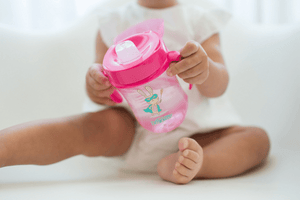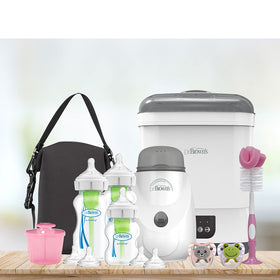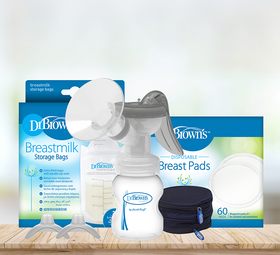
The First 6 Weeks With Your Baby: What No One Tells You
You may have read every parenting book out there and watched countless YouTube videos. But the reality of those early days often feels very different. The first few weeks with your newborn are a blur of constant feeding, cuddles, unpredictable sleep cycles, learning your baby’s cues… and constantly questioning if you’re doing it “right.”
While there’s no one perfect way, it’s crucial to find what works for you and your baby.
In this brief guide, you’ll learn what to expect in the first few weeks, along with practical ways to address common baby issues. Dr. Brown’s Australia is trusted by parents across the country for expert feeding solutions and baby care support.
Understanding the First Few Weeks
Your baby has just transitioned from the quiet comfort of the womb into a bright, noisy world. So for now, your goal is connection and comfort, not perfection. There’s probably no strict routine yet, because every baby and parent’s journey is unique.
Most of your days (and nights) would revolve around feeding, nappy changes, and learning to read your baby’s unique signals. Some days, you’ll feel confident. Others, it’ll feel like you’re guessing, and that’s perfectly normal.
Feeding Reality Check: Every 2 Hours Is Normal
In the first weeks, newborns typically feed 8–12 times a day, often in short bursts.
If you’re breastfeeding:
Try gauging intake by watching your baby’s reactions, relaxed body, drowsiness, and loose hands. And if you start getting sore nipples or supply worries, it’s common; you can reach out to the Australian Breastfeeding Association (ABA) for advice and community support.
If you’re bottle feeding:
Newborns usually take 30–60 mL per feed every 2–3 hours. Instead of strictly focusing on a schedule, look for hunger cues to learn when it’s time to feed… like rooting, lip-smacking, or hand sucking.
Pace the feeds, keep the baby upright, and sterilize bottles regularly to protect from bacteria. (Check here for sterilizers)
To reduce spit-up and trapped air, use bottles designed with anti-colic systems, like the Dr Brown’s Anti-colic bottles, which prevent gas and fussiness by allowing air bypass the milk.
Note: Feeding shouldn’t hurt or feel like a struggle. If you experience pain or baby isn’t gaining weight, talk to your Child and Family Health Nurse or GP early.
What’s A Normal Sleep Routine for Newborns?
A baby's sleep cycle doesn’t follow adult logic. They may snooze for 14–17 hours in total, but only in short cycles of 2–3 hours at a time.
Babies don’t know day and night, so some mix it up, waking just as you drift off. The key is to create consistency, not perfection.
Try:
-
Safe sleep setup: put baby on their back, on a flat surface, in their cot or bassinet.
-
Use white noise, dim lighting, and gentle routines before bedtime.
-
Follow safe-sleep guidelines from Red Nose Australia to reduce SIDS risk.
This helps them feel secure so they can learn to sleep longer stretches later on.
Healing Your Body & Mind
You’re recovering from birth, adjusting to hormones, and surviving on broken sleep, so be kind to yourself.
Physically, rest when you can, hydrate often, and accept help (yes, even folding laundry counts). If you’ve had stitches or a cesarean, recovery may take longer; take it slow and follow your doctor/midwife’s guidance.
Emotionally, it’s common to feel overwhelmed or teary in the first two weeks. If the sadness or anxiety lasts longer, reach out. Healing takes time for your body, your emotions, and your confidence as a parent. But you don’t have to deal with it alone.
Support lines:
-
PANDA (Perinatal Anxiety & Depression Australia): 1300 726 306
-
Lifeline: 13 11 14
-
Beyond Blue: 1300 22 4636
Building Bonds With Small Moments
Babies bond through touch, voice, and presence. It isn’t instant and that’s okay. Those small daily acts: skin-to-skin contact, soft talking, responding when your baby cries, and gazing into their eyes during feeds.
Encourage your partner to take part too; reading a short story or giving a warm bath can be a special bonding ritual for both parents.
Babies thrive when they feel safe and soothed. Each cuddle builds their sense of trust and your confidence as a caregiver.
When to Ask for Help?
Sometimes, you need extra hands or expert advice. Reach out if you notice:
-
Persistent feeding problems or poor weight gain
-
Excessive crying or reflux symptoms
-
Emotional distress beyond the “baby blues” phase
In Australia, you can access:
-
Child and Family Health Nurses (free through local councils)
-
GPs and Pediatricians for feeding or medical concerns
-
Parent Helplines in each state (e.g., Tresillian NSW, Ngala WA)
Asking for help isn’t a weakness; it’s part of strong parenting.
Quick Checklist: Your First 6 Weeks at a Glance
✅ Feed frequently and on demand — babies know what they need.
✅ Rest whenever possible; chores can wait.
✅ Keep baby’s sleep space safe and simple.
✅ Accept support from friends and family.
✅ Stay hydrated and eat well to nourish your body.
✅ Take lots of photos, because even the sleepless nights are fleeting.
Closing Thoughts: You’re Doing Better Than You Think
The first few weeks are messy, emotional, and unforgettable. You’ll second-guess yourself, celebrate small wins, and discover strengths you never knew you had.
Keep in mind, perfection isn’t the goal, connection is.
At Dr Brown’s Australia, we’re here to help you through those early weeks with thoughtfully designed feeding and baby-care accessories. Including anti-colic bottles, transition cups, sterilizers, breast pumps, etc. To support your baby’s growth and your peace of mind.
Discover the full range of feeding and baby-care solutions at drbrowns.com.au.







